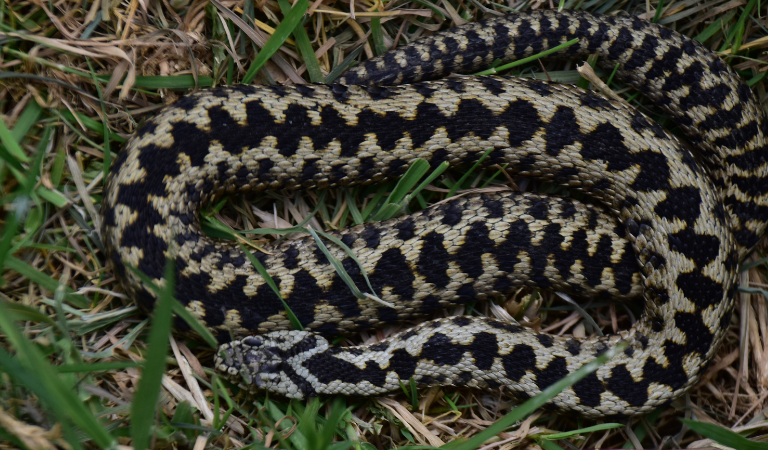Sorry about that! It looks like we’ve run out of stock for that product. Sign in below and we’ll send you an update when it’s back in stock.
"Over the summer, we've received reports from distressed customers whose dogs have unfortunately suffered from snake bites, more specifically, adder bites. Understanding the dangers of snake bites, especially if you find yourself thinking, "My dog's been bitten by a snake," is crucial. For this reason, we urge you to delve into this article. Focusing on the UK's only venomous snake, the Adder, we provide essential information about its appearance, habitat, and, importantly, the risks it poses to our canine companions. Familiarizing yourself with the symptoms of a snake bite on a dog and immediate actions to take can be life-saving. So, for those concerned with the all-too-common search query "Snake Bite Dog," read on for invaluable insights."
In this article we are taking a brief look at Adders and the potential risk to your dogs. There’s a good chance you won’t encounter one but if you do, here are some of the key facts that could help you save your pet in the worst case scenario.
The Adder is the only venomous snake in the UK and is protected by the Wildlife and Countryside Act 1981; it is an offence to harm, injure or kill them.
The other types of snakes found in UK are the Grass Snake and Smooth Snake, although neither is venomous. The Grass Snake can bite if cornered or attacked but this is very rare and certainly won’t be dangerous or fatal.
Adders have a V shape marking on their head and a dark, distinctive zigzag pattern down their back. They are small grey/brown in colour and are quite small ranging from 60 to 80cm in length. Adders only weigh about 50 to 100g but can live up to 15yrs old.
UK Native Snakes and Dog Safety
While the UK isn’t known for dangerous wildlife, it’s home to one venomous snake, the adder. Most active between March and October, adders prefer heathlands, woodlands, and coastal paths, all popular dog-walking spots. Though shy by nature, they may bite if disturbed or stepped on. Keeping your dog on a lead in high-risk areas, especially during warm spring days, is the best way to avoid contact. Recognising early signs of a bite and acting quickly can save your dog’s life.

Adders are found in a number of differing habitats including long grass, woodland, moorland, sand dunes and coastal paths. They are active from February through to October and they go into hibernation during the winter.
In early spring when the days are starting to warm up, the Adder will find warm sunny spots for it to warm up. This may be on rocks, stones or a sunny clearing, which can also include pathways.
Adders are not aggressive. Usually they are extremely sensitive and thus aware of any movement or vibration coming their way, meaning they will disappear into the undergrowth long before you get a chance to see them however; if startled or cornered, they will bite.
If your dog has disappeared from view and a yelping is heard this may well be the result of a snake bite. Action is needed immediately!
It’s not always easy to see the puncture wounds, particularly on long or thick coated breeds.
If bitten on the legs or feet then limping will be obvious.
If you suspect an Adder bite then contact the vet immediately and tell them you are on your way.
Keep calm and keep your dog as still as possible, if you have a car, carry the dog to it or move the vehicle as close to the dog as possible. This is to keep the blood circulation to a minimum reducing the damage the venom could cause.
Symptoms can develop in minutes or may take longer in some cases however, if the venom has gone straight into the blood stream symptoms can occur very quickly.
Whatever you do, DO NOT attempt to treat it yourself, this would most likely make things worse and make it harder for your vet to successfully treat.
Adder Bite Symptoms
• Pain and swelling around the bite
• Limping if bitten on feet or limbs
• Vomiting and Diarrhoea
• Gums may be pale in colour
• Panting
• Drooling
• Swelling to neck or face
• Breathing difficulties
• Severe bruising
• Tremors/Seizures
• Collapsing
To help prevent your dog being bitten, avoid areas known to be high risk Adder habitat, especially through the moths of July and August. Perhaps keep dogs on their leads whilst walking in these areas.
You can even attach a bell to your dog’s collar or harness which would create enough noise to alert the Adder long before your dog can put itself in harm’s way.
When on holiday it is a good idea to look up the area for reports or sightings of Adders, and check the nearest veterinary practice, perhaps log the number in your phone whilst in that area.
As touched upon above, Adders are not inherently aggressive and will only use their venom when they feel their life is at risk but prepare to act quickly if the worst does happen.
As with all our articles, if you have any questions then please do feel free to get in touch and we will do our best to help.
Related Articles:
How do I know if my dog has been bitten by a snake?
The Hidden Summer Hazards